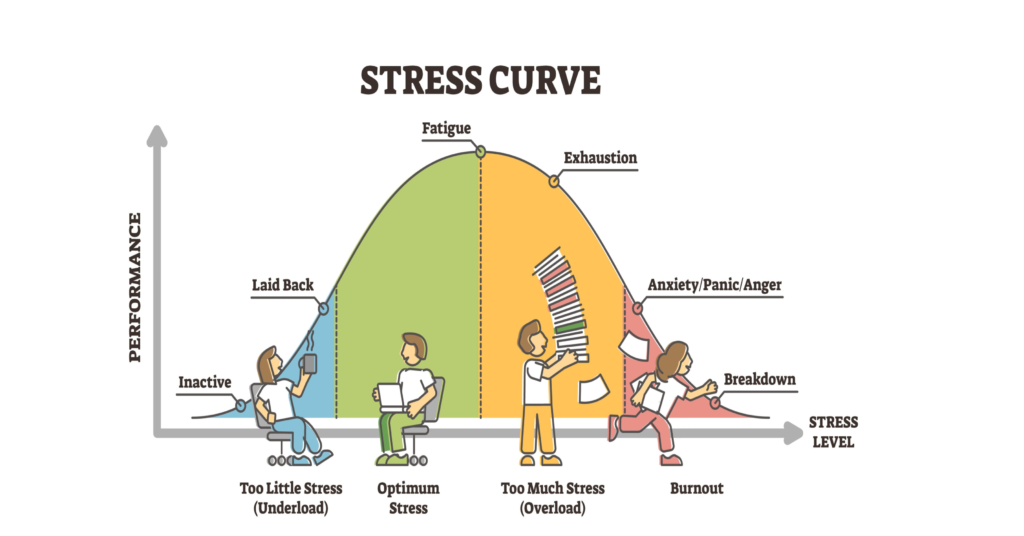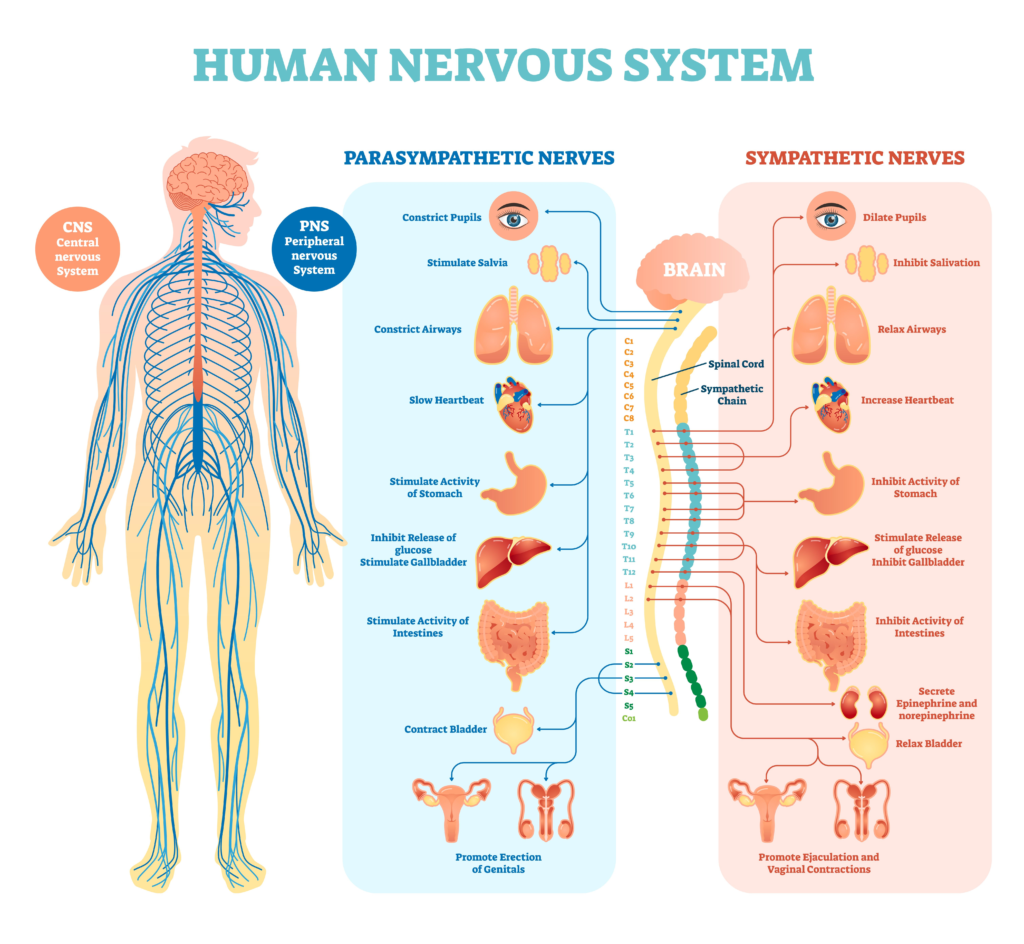Introduction
In our fast-paced, modern world, the Impact of Stress has become an inseparable part of daily life. From the pressures of work and family to the constant digital bombardment, stressors are omnipresent. While a certain level of stress can be motivating, chronic and unmanaged stress can pose serious risks to our physical and mental wellbeing.
Recent research suggests that stress might not be entirely harmful. In fact, understanding the intricate relationship between stress and health can help reevaluate its impact on our lives & becomes essential to navigating our way to stress recovery.
In this blog, we will look into the hidden ways stress can impact our health and explore effective strategies to manage and in certain situations potentially transform stress from being a foe to a friend.
The Physiology of Stress
Stress is our body’s response to external demands or threats. Triggered by the sympathetic nervous system’s “fight-or-flight” reaction, it releases hormones like cortisol and adrenaline. Acute, short term stress response can enhance performance and alertness, preparing us to tackle the situation at hand. However, when it becomes prolonged through excessive work demands, constant worries, trauma, or challenging life circumstances it can lead to significant health problems.
Fig.1 below shows how some stress can help us work at our best but also what happens when demands become too much.

The Stress-Health Connection

Stress can have a significant impact on both physical and mental health. The stress response varies from person to person. However, chronic stress/remaining in sympathetic state (see Fig. 2) can lead to the dysfunction of the hypothalamic-pituitary-adrenal (HPA) axis, a complex system that governs our body’s stress response. This can lead to imbalances in cortisol, DHEA and other hormones, which can affect various body systems & functions such as:
1. Blood glucose imbalance: This can increase the risk of developing insulin resistance and eventually type 2 diabetes.
2. Weight Gain and Obesity: Stress-induced hormonal changes can lead to an increase in appetite, particularly for high-calorie and sugary foods. Additionally, stress can promote the accumulation of fat around the abdominal area, which is associated with an increased risk of obesity and metabolic disorders. Emotional eating can further contribute to weight gain.
3. Sleep Disturbances: Stress and sleep are intricately linked. While stress can lead to insomnia and difficulty falling asleep, inadequate sleep, in turn, can increase stress levels. This dual relationship between stress and sleep disruption can have a profound impact on both mental and physical health.
4. Cardiovascular Issues: Elevated levels of stress hormones can lead to increased heart rate and blood pressure, putting a strain on the heart and blood vessels. Over time, this can contribute to the development of cardiovascular diseases like hypertension, heart disease, and stroke.
5. Immune System Suppression: Prolonged exposure to stress hormones suppresses immune function (reduces the production of immune cells and antibodies), making us more susceptible to infections, allergies, and autoimmune disorders.
6. Digestive Problems: The gut and the brain are closely connected through the gut-brain axis. Stress can disrupt this connection, leading to gastrointestinal issues such as irritable bowel syndrome (IBS), indigestion, and acid reflux. It can also affect nutrient absorption and disrupt the balance of beneficial gut bacteria, leading to various gastrointestinal problems.
7. Skin Issues: Stress can aggravate acne, eczema, and psoriasis. It can also lead to premature aging and a dull complexion due to reduced collagen production.
8. Mental and Emotional Stress: Chronic stress can contribute to the development of mental health conditions such as anxiety and depression. It can affect cognitive functions such as memory, attention, and decision-making, leading to reduced productivity and impaired daily functioning
In simple terms, understanding the intricate connection between stress and our well-being highlights the importance of adopting effective stress management techniques. These approaches are crucial in protecting both our physical health and mental balance.
Managing Stress
Effective stress management involves a combination of physical, mental, and emotional strategies.
The goal is to activate the parasympathetic nervous system, as depicted in Figure 2. This activation triggers the release of serotonin and GABA, which aids in maintaining a sense of calm and positivity during and after stressful events. The parasympathetic nervous system is responsible for the body’s “rest and digest” functions, and when the brain is in a parasympathetic state, it can have various positive effects on overall health.
Finding a balance and utilizing stress in a healthy way is essential. While stress can serve as a motivator and drive us to achieve our goals, it’s important to recognize the signs of excessive stress and take steps to manage it effectively
Begin with identifying the source of stress and address the root cause whenever possible. Sometimes, simply identifying the source can provide some relief.
One key aspect of finding balance is prioritizing self-care – which we discussed in my first blog. This means taking the time to engage in activities that bring us joy and relaxation, such as hobbies, spending time with loved ones, or enjoying nature. It is important to set realistic goals and priorities. Learning to say no when necessary and delegating tasks can help feeling overwhelmed and prevent burnout.
Taking care of our physical health through regular exercise, mindfulness, meditation, a balanced diet, and sufficient sleep is also crucial to stress management.
Talking to trusted friends, family, or a therapist can provide valuable insight, advice, and emotional support during stressful times. Having a strong support network can alleviate mental and emotional stress and provide a sense of comfort and understanding.
Exploring Further Stress Management Resources
New science is showing that it’s not the actual stress that we experience, but our body and minds response to stress that impacts our health.
See: https://www.frontiersin.org/articles/10.3389/fpsyg.2019.02962/full
Stanford research
Stanford University has developed various tools and programs to help individuals manage stress effectively:
One notable resource is their toolkit designed to reshape our mindset and turn stress into a positive force for well-being:
Check out the free toolkit here: Toolkit
The accompanying workbook adds value: Workbook
BrainTap – Another great way to rewire how we respond to stress and practice mindfulness

If you’re looking for immediate results & want to heal from stress, I invite you to try BrainTap. BrainTap is a revolutionary groundbreaking brain wave technology backed by neuroscience that offers a form of guided meditation using a combination of light and sound therapy. The device consists of headphones with LED lights and audio stimulation designed to help users relax and reduce stress. 20 minutes a day can help with relaxation, mindfulness, sleep improvement, reduce mental fatigue and improve energy levels, memory and learning. Plus, all of the health benefits when your brain resynchronizes to remain in a more parasympathetic state.
Learn more here and read the science behind BrainTap, their amazing testimonials and online reviews.
Note, that light and sound intensity are adjustable on the headset so you can find a setting that is right for you. Do not use headset if sensitive to flashing light or diagnosed with seizures. Please refer to Brain Tap user manual for further information.
Conclusion
Stress is a complex phenomenon that can have both positive and negative impacts on our health. While chronic stress remains a significant concern, understanding the relationship between stress and well-being can help us view stress from a different perspective. Emphasizing stress management and embracing positive stress can pave the way for a healthier and more resilient life.
Remember that individual responses to stress and its management can vary, so it’s essential to find a personalized approach that works best for you. Experiment with different strategies to find what suits you best. The key is to develop healthy habits that can effectively manage stress in the long term. As we continue to explore stress and its multifaceted effects, we can learn to turn it from a foe into a friend.

